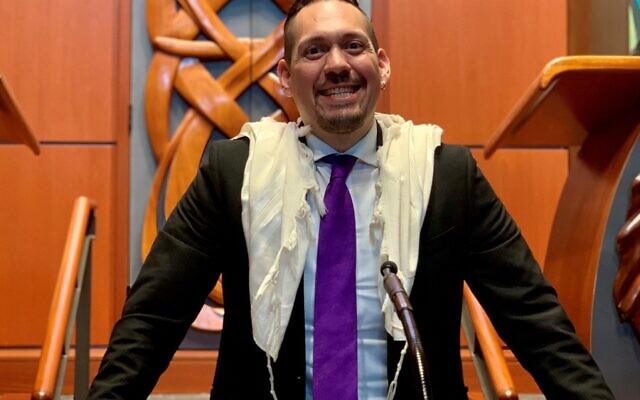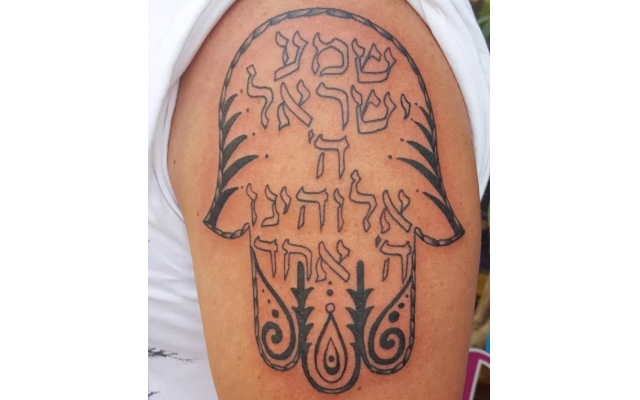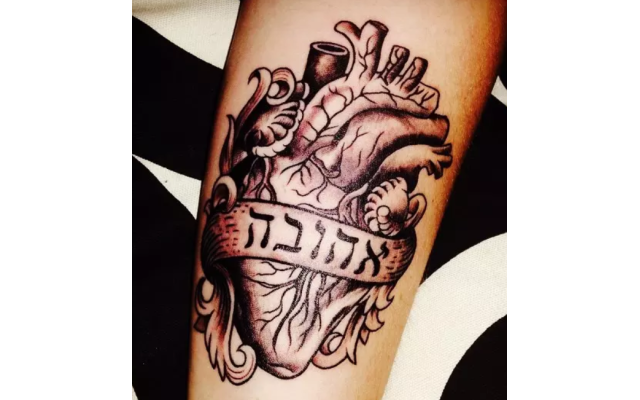Tattoos Get a Second Look at Etz Chaim
Conservative rabbi Micah Miller says Jewish law needs to reevaluate tattoos.
To tattoo or not to tattoo: that was the question at the center of a discussion at Congregation Etz Chaim, the Conservative synagogue in Marietta, on October 26. Rabbi Micah Miller, the congregation’s associate rabbi, led an hour-long conversation delving into the history of tattooing in Jewish law and practice.
Miller knows from personal experience. The 34-year-old rabbi has several tattoos, including those he already had when he started studying to be a rabbi and another that he obtained while in rabbinical school. During the discussion at Etz Chaim he came down, decisively, on the side of those who believe Conservative Judaism’s well-established opposition to tattooing should be reevaluated.
“I feel on some level, if rabbinical schools are letting people into school who have tattoos and then saying go ahead and be a rabbi … Well, we’ve got to try and make this fit in a way that honors their tradition and doesn’t just say, ‘just get rid of it.’ I do think there is clearly a way of limiting this and looking at it authentically, what the law was about.”
In 1997, the Conservative movement’s Rabbinical Assembly asked its Committee on Law and Standards to look into the issue of tattooing. There, by a vote of 77 to 0 — with 4 abstentions — the rabbis voted to maintain a ban on all tattoos, except those that might be medically required.
The rabbi who wrote the responsa or opinion on Jewish law was Rabbi Alan Lucas of Temple Beth Shalom of Roslyn, N.Y. The opinion was based, essentially, on the injunction found in chapter 19 of Leviticus, which prohibits “gashes on the flesh or any incised writing upon you.”

“In our day,” Rabbi Lucas wrote, “the prohibition against all forms of tattooing, regardless of their intent, should be maintained. In addition to the fact that Judaism has a long history of distaste for tattoos, tattooing becomes even more distasteful when confronted with a contemporary secular society that is constantly challenging the Jewish concept that we are created b’tselem Elohim, ‘In the Image of God,’ and that our bodies are to be viewed as a precious gift on loan from God, to be entrusted into our care and not our personal property to do with as we choose.”
At Congregation Etz Chaim, Rabbi Miller, who was interviewed after his presentation, maintains that in the last 2,000 years Jewish authorities have not always been in agreement on whether a total ban on tattooing is required. He believes that the rabbis of the Talmud had ruled that only certain kinds of tattoos are forbidden.
“I think the rationale of the Talmud was not to put other gods on yourself. So even though you might really like some of the Hindu gods or be a self-proclaimed student of Buddha, you shouldn’t get Buddha tattooed on yourself.”
Miller believes that just as we adorn Torah scrolls with artful cloth coverings and crowns made of precious metals, so we may think of tattoos as a way of honoring the human body. Moreover, tattoos in contemporary society have become socially acceptable.
“It’s a way of adorning the body and not desecrating the body. That might not be right for everybody. A lot of people who are outside of the tattoo community would say that this is damaging what God gave you. But what I said to people in my class is that no tattoo artist, at least no good, reputable tattoo artist, is going to let me put something ugly on my body. There’s a lot of actual art that goes into it.”
Even in Israel, tattooing has reached new heights of popularity. In 2019, a tattoo convention in Tel Aviv brought together 4,000 tattoo artists and fans from around the country.

According to Oz Almog, the author of “Sabra: The Creation of The New Jew,” the widespread acceptance of tattooing in the Jewish state is one more indication of the transformation Israel has undergone in the past several decades. As he told Haaretz, Israel’s leading daily newspaper, tattoos say a lot about how Jews in the Holy Land view themselves.
“The tattoo fad symbolizes Israel’s transition from an austere and khaki-clad society that played down the importance of aesthetics to a society that pays homage to beauty, splendor, ornamentation and glitter.”
That is strikingly similar to how Rabbi Miller views the progress surrounding the acceptance of tattoos here.
“For a long time, people thought only drunken sailors and gang members got tattoos, but I tell people that today that’s not the case. Your accountant might have a tattoo. Your children’s pediatrician or their kindergarten teacher might have a tattoo. Or your rabbi. And so, it’s also become this thing where I think culturally, in society, it’s more accepted for people. They don’t look at a person differently, necessarily in a bad way, just because of tattoos.”
Times have changed, he says, and the Conservative movement should change, too. Twenty-four years after the Conservative rabbis’ responsa, Miller is working with a colleague on submitting an update to the Rabbinic Assembly’s Committee on Law and Standards.






comments